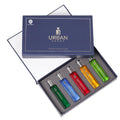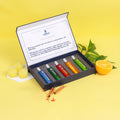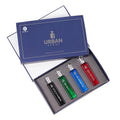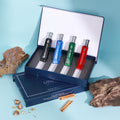The Difference Between Perfume, Fragrance, and Scent

The Difference Between Perfume, Fragrance, and Scent
Through this blog, you will know what is the difference between perfume, fragrance and scent, along with a list of features stating concentration level, long lasting effect and more.
When it comes to the world of smells and aromas, terms like perfume, fragrance, and scent are often used interchangeably. However, they each have distinct meanings and uses. Understanding the difference between perfume and fragrance can help you choose the right products and appreciate the nuances in the realm of olfactory experiences.
Let’s understand the difference between perfume and scent and other fragrances:
What is Perfume?
Perfume is a term that specifically refers to a highly concentrated liquid blend of aromatic oils, alcohol, and water. Historically, perfumes were made from natural ingredients like flowers, herbs, and spices, and were used in religious ceremonies and for personal uses.
Key Characteristics of Perfume:
- Concentration: Perfume has the highest concentration of fragrance oils, typically between 20% to 30%. This high concentration makes it the most potent and long-lasting form of fragrance.
- Longevity: Due to its high concentration of oils, perfume can last anywhere from 6 to 8 hours on the skin, sometimes even longer. It also depends on the ingredients and your skin type (Oily or Dry). Perfumes tend to cling better on hydrated skin.
- Cost: Perfumes are usually the most expensive form of fragrance because of the high concentration of essential oils and the complex processes involved in their creation.
- Usage: A small amount of perfume is sufficient to deliver a strong, lasting scent. It's typically applied to pulse points such as the wrists, neck, and behind the ears, where the warmth of the skin helps to diffuse the fragrance.
- 5.Composition: The difference between perfume and fragrance is that perfumes have complex compositions. It often contains top notes (the initial, lighter smells), middle notes (the heart of the fragrance), and base notes (the long-lasting, deep scents).
What is a Fragrance?
If you are still wondering about the difference between fragrance and perfume, then you need to understand it first. Fragrance is a broader term that refers to any pleasant smell, but it is often used in the context of personal care products, home scents, and air fresheners. In the cosmetic industry, "fragrance" refers to the blend of essential oils and aroma compounds used to give products their unique smell.
Key Characteristics of Fragrance:
- Versatility: Fragrance can be found in a wide variety of products, including perfumes, colognes, lotions, soaps, shampoos, candles, and even cleaning products.
- Varied Concentrations: The concentration of fragrance oils in products labeled as "fragrance" can vary widely. For instance, body mists and sprays have a lower concentration, while eau de toilette and eau de parfum have higher concentrations.
- Synthetic vs. Natural: Fragrances can be made from natural essential oils or synthetic aroma compounds. Many commercial fragrances are synthetic due to cost and consistency considerations.
- Regulation: The term "fragrance" in product labeling can sometimes be vague. Regulations in different countries may allow companies to use the term without disclosing the specific ingredients, as the formulation is often considered a trade secret.
- Purpose: Fragrance is used not just for personal scent but also to enhance the sensory appeal of various products. For example, a lotion with a pleasant fragrance can enhance the user experience, making it more enjoyable to use.
What is a Scent?
The main difference between perfume and scent is that scent can be referred to as any smell. Whether pleasant or unpleasant. It is the term that describes the actual perception of smell by our nose.
Key Characteristics of Scent:
- Broad Definition: Scent encompasses all kinds of smells, including those from flowers, food, nature, animals, and even inanimate objects. For example, the scent of roses, the scent of freshly baked bread, and the scent of rain are all different types of scents.
- Overall Experience: The perception of scent is highly subjective and can vary widely from person to person. What smells pleasant to one person might not be enjoyable to another. This subjectivity is due to individual differences in olfactory receptors and personal associations with specific smells.
- Connected to Emotion: Scent is closely linked to memory and emotion. Certain scents can trigger vivid memories and strong emotions because the olfactory bulb, which processes smells, is directly connected to the limbic system, the part of the brain involved in memory and emotion.
- Natural Sources: Natural scents come from a wide array of sources, such as flowers, herbs, spices, trees, and animals. These natural sources have been used for centuries to create perfumes and other fragrant products.
- Artificial Sources: Artificial or synthetic scents are created through chemical processes and are designed to mimic natural smells. These are commonly used in perfumes and fragrances to provide a consistent scent that doesn’t change with the variability of natural ingredients.
Perfume vs Fragrance vs Scents
The age-old debate regarding perfume vs fragrance is going strong. The difference between perfume and fragrance may seem similar, but they have a whole different meaning.
|
Feature |
Perfume |
Fragrance |
Scent |
|
Concentration |
High (20-30% aromatic oils) |
Varies widely (low to high) |
Not applicable (general term) |
|
Longevity |
Long-lasting (6-8 hours or more) |
Varies (short to long) |
Depends on source |
|
Cost |
Generally expensive |
Varies (usually less expensive) |
Not applicable |
|
Usage |
Applied to pulse points |
Used in various products (lotions, soaps, etc.) |
Refers to any smell, pleasant or unpleasant |
|
Ingredients |
High-quality essential oils |
Can be natural or synthetic compounds |
Natural or artificial sources |
|
Purpose |
Personal scent |
General pleasant smell in products |
General term for any smell |
|
Product Types |
Limited to perfumes and colognes |
Includes perfumes, colognes, lotions, shampoos, candles, etc. |
Not limited to products |
|
Application |
Small amounts needed |
Varies depending on product type |
Not applicable |
|
Examples |
Luxury perfumes, high-end colognes |
Body sprays, scented lotions, air fresheners |
Roses, baked bread, rain |
In a nutshell, understanding this difference between perfume and scent can help you make informed choices when selecting products for personal use or for your home. Whether you are drawn to the potent allure of a premium perfume for men and women, or the versatility of fragrances in everyday products, Lyla Blanc has a fragrance for all occasions and seasons.
Visit our luxury perfume stores online to browse an array of fragrances in a bottle in the form of perfumes, deodorants and attar to complement your everyday style and personality. Shop our brand-new perfumes for men and women online, as each one of our products will surely hold a special place in your collection.
FAQ’s
- What is the difference between fragrance and perfume?
Fragrance is a general term for any pleasant-smelling product, including lotions, candles, and sprays. Perfume is a specific type of fragrance with a high concentration of aromatic oils, making it stronger and longer lasting. In conclusion, all perfumes are fragrances, but not all fragrances are perfumes.
- What is the difference between perfume and scent?
Perfume is a concentrated, luxurious product with a high amount of aromatic oils, designed for long-lasting personal scent. Scent is a general term that refers to any smell, pleasant or unpleasant. Essentially, perfume is a specific type of scent, but not all scents are perfumes.






